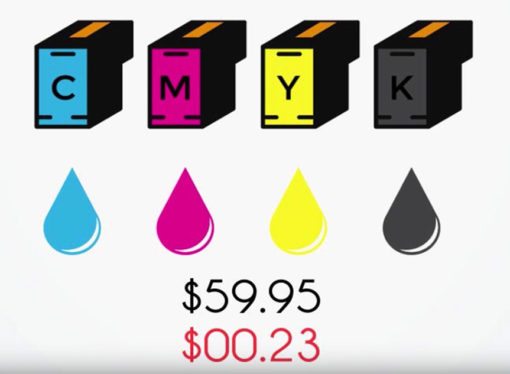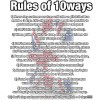Whether things are tight or you want to save some cash, cutting back on your shopping bill is a smart move. Many of us simply don’t know where our money goes when we hit the supermarkets. Luckily, there are some tips you can try that will save you money.
1. Write a list first

First things first, you’re going to need a list! If you head to the supermarket without one, you’re likely to buy anything you cast your eyes on. No! Things have to change. Spend ten minutes writing a simple list of the things you need before you head to the shops.
2. And make a meal plan
While we’re on the topic of planning, you should be making meal plans too. Sure, it may be boring to know what you’re going to eat Monday to Friday, but this small tip could save you money. Planning each of your meals out means that you will know exactly what you need. That way, you won’t end up overspending on ingredients and extras you don’t need.
3. Bulk-buy non-perishable food on sale

You’re walking down the supermarket aisle and see some tinned beans on offer… What do you do? The answer is simple. Buy them in bulk. If you can afford to stock up on these non-perishable items, you can save yourself a lot of money in the long run. Get creative with cupboard essentials, such as beans, pasta, tinned tomatoes, chickpeas and more.
4. Pre-cook food for the week
 Cooking food in huge batches is a smart way to save yourself money each week. For example, you could make a stew and a curry on Sunday eve and portion both up in sealable boxes. Freeze a couple for the end of the week and put the rest in the fridge. That way, you have meals for the entire week and you will have spent less.
Cooking food in huge batches is a smart way to save yourself money each week. For example, you could make a stew and a curry on Sunday eve and portion both up in sealable boxes. Freeze a couple for the end of the week and put the rest in the fridge. That way, you have meals for the entire week and you will have spent less.
5. Visit the local market
While the supermarket may be the easiest option, the best way to save money is to shop around. Heading to a local market could be a smart way to save those pennies. What’s more, you can enjoy that smug glow of helping out smaller, independent traders.
6. Buy local produce in season

Buying local is one thing, but make sure what you buy is in season. Figuring this out will help you save money on your food shop since the items you buy will naturally be cheaper at that time. The Vegetarian Society has a useful resource you can use to check when certain fruit and vegetables are in season.
7. Shop around at different supermarkets

Got some time on your hands? Rather than merely heading to one supermarket, try hitting up a few. Doing so will help you figure out where you can get the best deals. For example, you may find that one supermarket sells cheap-ish eggs while another sells cheap bread.
8. Freeze reduced items
Of course, one of the best ways to save money is to check the reduced section! Don’t worry if the items are close to their use by dates. You can always freeze these things and keep them for a rainy day. For example, if you find that some ready meals are on sale, check the label on the back and see if there is any advice on freezing them.
9. Ditch the brand names

If you’re still buying predominantly name brand products, it’s time to change your ways! Experiment with supermarket own brands instead. If you’re loyal to a certain brand, you might want to try a few different options. Go ahead and be brave. (It will save you cash!)
10. Shop with your partner or housemates


Spoiler: Shopping for one can be expensive! If you live with your partner or housemates, consider shopping together. If you cook your meals together (in bulk) and share the cost, you will ultimately start saving some money. Speak to the people you live with.
11. Stop wasting food at home

Are you guilty of wasting food at home? If you let things spoil in your fridge, you need to do something about that. Ensuring that your fridge is just below 5°C will help you to keep food fresher for longer. You should also get into the habit of using up everything in your fridge before you head to the supermarket again. Give it a go.
12. Buy what you need (not what you want)
When you head to the supermarket, do you buy what you want or what you need? Be honest. If you’re filling up your basket or trolley with biscuits, crisps, and other fun extras, it’s plain to see where your cash is going. While treating yourself is fine, limit it a bit.
13. Figure out the best time to shop
Do you know the best time to shop? Figure out when your local supermarket tends to reduce items. It’s a game-changer. Let’s say you go to the same shop all the time. Pay close attention to when the reduced area is full. If you can time your visits well, you can save yourself a fortune.
14. Check out the world food aisle

The world food aisle is often a treasure chest of goodies! The ingredients that you will find here are sometimes cheaper than they are elsewhere. For example, you may be able to get staples, such as rice, chickpeas, and sauces in this aisle. Don’t miss out.
15. Don’t shop when you’re hungry

Did your mum ever tell you this one? Don’t shop right before dinner time. If you’re feeling peckish as you walk around the shop, you’re likely to pick up anything and everything you see. Instead of making that mistake, have a snack before you start shopping.
16. Sign up to loyalty cards

Loyalty pays. Collecting points as you shop at different supermarkets will soon add up. It costs you nothing to sign up to a few cards and, after a while, you will start getting rewards. It’s a no-brainer. The next time the assistant says ‘do you have a loyalty card’, your answer should be ‘no, but can I get one?’
17. Avoid shopping on payday

Shopping when your bank account is healthy could be a recipe for disaster. When you’re feeling flush, you’re more likely to spend over the odds on certain items. Shopping mid-month and towards the end of the month instead could mean that you spend less.
18. Cook meals from scratch

Do you rely on ready meals? Change things up and start cooking from scratch. Making meals yourself may take more time, but it will save you money too. New to the kitchen? BBC Good Food has a bunch of easy recipes to get you started!
19. Try food shopping online

If you find yourself overspending when you go to the shops, try shopping online instead. That way, you can edit your basket as you go and see how much everything costs. If you’ve gone over your budget, you can always discard items before you pay.
20. Set a budget!

Setting a budget is crucial when you’re food shopping! If you don’t know how much you’re willing to spend, you’re going to end up spending more than you expect. Work out a reasonable weekly (or bi-weekly!) budget and try to stick to it. Simple.
The takeaway!
Trying to save money on your food shopping can be tricky. However, when you work hard at cutting back and shopping around, it could make all the difference. Try out these tips for yourself and see which ones work for you! Get shopping.







![How to remove permanent marker from everything [Infographic]](https://10ways.com/wp-content/uploads/2016/02/marker-en-510x374.jpg)













![Windows 10 uploading slowing your internet / using up tons of bandwidth etc [how to fix]](https://10ways.com/wp-content/uploads/2015/08/stealing-100x100.jpg)








